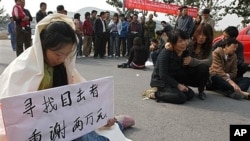Security camera footage of a toddler who was hit by two trucks and ignored by passersby has provoked debate about the social costs of China's rapid economic change.
Two-year-old Wang Yue, affectionately known by her parents as Yueyue, had wandered out of the family hardware store last Thursday in the southern city of Foshan.
Unaccompanied, she strayed into the road and was knocked over and crushed under the wheels of a van. Moments after the driver fled the scene, a truck driver failed to spot the unconscious girl and drove over her legs.
A nearby security camera captured footage of Yueyue lying in the street for the next 15 minutes, as at least 18 people walked by, ignoring her plight. The video went viral, and more than four-and-a-half-million netizens voiced outrage on Sina Weibo, a Chinese microblogging Web site.
China’s foreign ministry spokeswoman Jiang Yu responded to the furor Thursday by saying the case would be handled according to law.
Both drivers responsible for Yueyue’s injuries - doctors at Guangdong military hospital say she has suffered extensive brain damage and is unlikely to regain consciousness - have been arrested. But the case, apart from its purely legal dimensions, has triggered a bout of national introspection, forcing China to confront the question of whether development and new-found prosperity is creating a lack of humanity.
Massive social dislocation
Professor David Bray, a University of Sydney senior lecturer who studies social change in contemporary China, says grappling with the country's moral and ethical status dredges a host of complex variables to the surface.
"It is this massive national urbanization process that has so many different elements," he says, explaining that perhaps 30 percent of China’s population has moved from the countryside to the cities in the last two decades alone. "But the driving themes of it are, it seems to me, massive social dislocation and this huge experiment in trying to rebuild society, just hoping that somehow or other it will all come back together."
Public hesitance about assisting those in need has been exacerbated by several high-profile incidents where Good Samaritans, helping the victims of accidents, have been detained by skeptical police or even opportunistically sued by the victims themselves.
Just last week, an American tourist made headlines in Hangzhou after trying to save a woman who was drowning in a lake, after which state media observed that Chinese are more reluctant to intervene in such a way.
Hon-lam Li, a philosophy professor at the Chinese University of Hong Kong, says public reluctance to help Yueyue isn't a social trait unique to modern China.
"Anywhere in the world, it is widely believed that there is an asymmetry between killing and not saving," he says. "By this I mean … people tend to think that they have a moral duty not to kill, but they do not have a moral duty to save."
Demands for new laws
Yueyue’s plight has incited demands for Good Samaritan laws that would legally protect anyone helping a stranger in peril. Yueyue’s rescuer, an impoverished scrap peddler who moved her out of the street and ran to find her parents, was given a government reward of about $3,000 for her actions. Chen Xianmei, 58, responded to the prize by saying she would donate most of the money to pay for Yueyue’s ongoing medical treatment.
Recent news reports say Chen has denied accusations she came to Yueyue's assistance only out of desire to seek fame and recognition, and that she has fled Foshan after becoming overwhelmed by donations and media attention.




